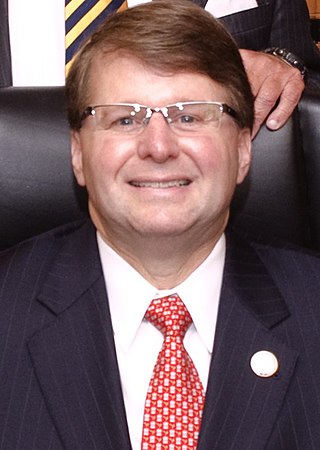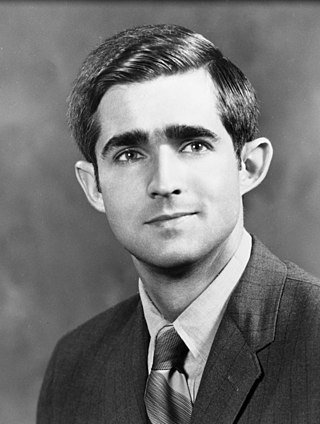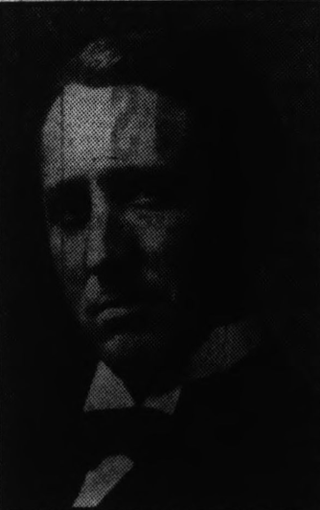
Mark D. Martin is an American jurist who served as the chief justice of the Supreme Court of North Carolina from 2014 through 2019. He was appointed by North Carolina Governor Pat McCrory to become Chief Justice on September 1,2014 upon the retirement of Sarah Parker. Martin was already running for the seat in the 2014 general election.
Robert Holt Edmunds Jr. is an American lawyer,formerly an associate justice of the North Carolina Supreme Court.

The Supreme Court of the State of North Carolina is the state of North Carolina's highest appellate court. Until the creation of the North Carolina Court of Appeals in the 1960s,it was the state's only appellate court. The Supreme Court consists of six associate justices and one chief justice,although the number of justices has varied. The primary function of the Supreme Court is to decide questions of law that have arisen in the lower courts and before state administrative agencies.
John Charles Martin was an American attorney,who retired as a Judge of the North Carolina Court of Appeals on August 1,2014.
John Marsh Tyson is an American jurist and government official who currently serves as a judge of the North Carolina Court of Appeals. He also previously served on the court from 2001 to 2009.
Eric L. Levinson is an American jurist,lawyer,and diplomat. He served on the North Carolina Court of Appeals and the North Carolina Superior Court. He also was the Justice Attache to the U.S. Embassy in Baghdad.

Willis Padgett Whichard is an American lawyer and a prominent figure in North Carolina politics and education. Whichard is the only person in the history of North Carolina who has served in both houses of the state legislature and on both of the state's appellate courts.

James Gooden Exum Jr. also known as Jim Exum is an American jurist who served on the North Carolina Supreme Court from 1975 to 1994,and as chief justice from 1986 to 1994.

Robert Neal "Bob" Hunter,Jr. is a North Carolina lawyer and retired jurist formerly serving on the North Carolina Court of Appeals and on the North Carolina Supreme Court.
Richard Cannon Erwin was a United States district judge of the United States District Court for the Middle District of North Carolina and politician who was the first African American to be elected to statewide office in North Carolina.

Wake Forest University School of Law is the law school of Wake Forest University,a private research university in Winston-Salem,North Carolina. Established in 1894,Wake Forest University School of Law is an American Bar Association (ABA) accredited law school and is a member of the Association of American Law Schools (AALS). The current dean is Andrew R. Klein.

David Maxwell Britt was a North Carolina politician and jurist who served as Speaker of the North Carolina House of Representatives,as one of the original judges of the North Carolina Court of Appeals,and finally as a justice of the North Carolina Supreme Court. He retired from the bench in 1982.

Albert Diaz is an American lawyer who is the chief circuit judge of the United States Court of Appeals for the Fourth Circuit. Diaz is the first Hispanic judge to serve on the Fourth Circuit. Prior to his appointment to the Court of Appeals,Diaz was a North Carolina state superior court judge and an appellate judge for the Navy-Marine Corps Court of Criminal Appeals.

Four justices of the seven-member North Carolina Supreme Court and four judges of the 15-member North Carolina Court of Appeals were elected by North Carolina voters on November 4,2014,concurrently with other state elections. Terms for seats on each court are eight years.
Elreta Alexander-Ralston was a mid-20th century black female American lawyer and judge in North Carolina at a time when there were only a handful of practicing female or black lawyers in that state. With an unusual career as a trial attorney and North Carolina District Court Judge,she has been noted for her “refusal to allow the circumstances of her birth,the realities of her time,and the limitations imposed by others define her destiny.”However,notwithstanding her accomplishments,Judge Alexander's legacy has remained largely unrecognized and her story untold. This confirms the notion that black women lawyers have received minimal universal recognition for their accomplishments and contributions to the legal profession.

Philip Berger Jr. is an American lawyer who has served as an associate justice of the North Carolina Supreme Court since 2021.

Lucy Noble Inman is a judge of the North Carolina Court of Appeals and formerly served as a special North Carolina Superior Court judge. She won election to the appellate court in a statewide race on November 4,2014.

One justice of the seven-member North Carolina Supreme Court and five judges of the 15-member North Carolina Court of Appeals were elected by North Carolina voters on November 8,2016,concurrently with other state elections. Terms for seats on each court are eight years.

One justice of the seven-member North Carolina Supreme Court and three judges of the 15-member North Carolina Court of Appeals were elected by North Carolina voters on November 6,2018,concurrently with other state elections. Terms for seats on each court are eight years. These elections were partisan for the first time since the elections of 2002. A law passed by the North Carolina General Assembly in 2017 cancelled primary elections for judicial elections in 2018 only,meaning that an unlimited number of candidates from any party could run in the general election.

Herbert Floyd Seawell was a North Carolina lawyer and politician who served as the United States Attorney for the Eastern District of North Carolina from 1910 to 1914,and judge of the United States Board of Tax Appeals from 1929 to 1936.













